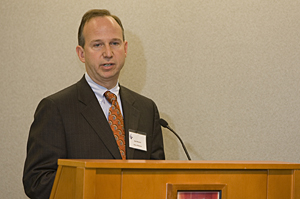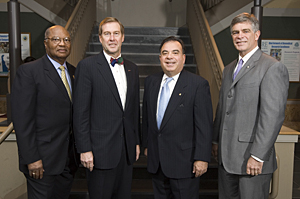
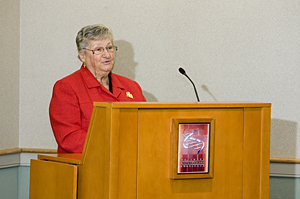
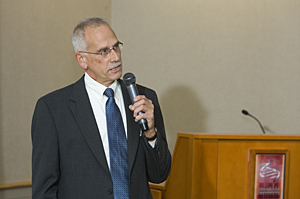
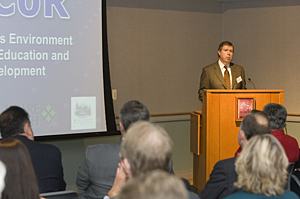
- Rozovsky wins prestigious NSF Early Career Award
- UD students meet alumni, experience 'closing bell' at NYSE
- Newark Police seek assistance in identifying suspects in robbery
- Rivlin says bipartisan budget action, stronger budget rules key to reversing debt
- Stink bugs shouldn't pose problem until late summer
- Gao to honor Placido Domingo in Washington performance
- Adopt-A-Highway project keeps Lewes road clean
- WVUD's Radiothon fundraiser runs April 1-10
- W.D. Snodgrass Symposium to honor Pulitzer winner
- New guide helps cancer patients manage symptoms
- UD in the News, March 25, 2011
- For the Record, March 25, 2011
- Public opinion expert discusses world views of U.S. in Global Agenda series
- Congressional delegation, dean laud Center for Community Research and Service program
- Center for Political Communication sets symposium on politics, entertainment
- Students work to raise funds, awareness of domestic violence
- Equestrian team wins regional championship in Western riding
- Markell, Harker stress importance of agriculture to Delaware's economy
- Carol A. Ammon MBA Case Competition winners announced
- Prof presents blood-clotting studies at Gordon Research Conference
- Sexual Assault Awareness Month events, programs announced
- Stay connected with Sea Grant, CEOE e-newsletter
- A message to UD regarding the tragedy in Japan
- More News >>
- March 31-May 14: REP stages Neil Simon's 'The Good Doctor'
- April 2: Newark plans annual 'wine and dine'
- April 5: Expert perspective on U.S. health care
- April 5: Comedian Ace Guillen to visit Scrounge
- April 6, May 4: School of Nursing sponsors research lecture series
- April 6-May 4: Confucius Institute presents Chinese Film Series on Wednesdays
- April 6: IPCC's Pachauri to discuss sustainable development in DENIN Dialogue Series
- April 7: 'WVUDstock' radiothon concert announced
- April 8: English Language Institute presents 'Arts in Translation'
- April 9: Green and Healthy Living Expo planned at The Bob
- April 9: Center for Political Communication to host Onion editor
- April 10: Alumni Easter Egg-stravaganza planned
- April 11: CDS session to focus on visual assistive technologies
- April 12: T.J. Stiles to speak at UDLA annual dinner
- April 15, 16: Annual UD push lawnmower tune-up scheduled
- April 15, 16: Master Players series presents iMusic 4, China Magpie
- April 15, 16: Delaware Symphony, UD chorus to perform Mahler work
- April 18: Former NFL Coach Bill Cowher featured in UD Speaks
- April 21-24: Sesame Street Live brings Elmo and friends to The Bob
- April 30: Save the date for Ag Day 2011 at UD
- April 30: Symposium to consider 'Frontiers at the Chemistry-Biology Interface'
- April 30-May 1: Relay for Life set at Delaware Field House
- May 4: Delaware Membrane Protein Symposium announced
- May 5: Northwestern University's Leon Keer to deliver Kerr lecture
- May 7: Women's volleyball team to host second annual Spring Fling
- Through May 3: SPPA announces speakers for 10th annual lecture series
- Through May 4: Global Agenda sees U.S. through others' eyes; World Bank president to speak
- Through May 4: 'Research on Race, Ethnicity, Culture' topic of series
- Through May 9: Black American Studies announces lecture series
- Through May 11: 'Challenges in Jewish Culture' lecture series announced
- Through May 11: Area Studies research featured in speaker series
- Through June 5: 'Andy Warhol: Behind the Camera' on view in Old College Gallery
- Through July 15: 'Bodyscapes' on view at Mechanical Hall Gallery
- More What's Happening >>
- UD calendar >>
- Middle States evaluation team on campus April 5
- Phipps named HR Liaison of the Quarter
- Senior wins iPad for participating in assessment study
- April 19: Procurement Services schedules information sessions
- UD Bookstore announces spring break hours
- HealthyU Wellness Program encourages employees to 'Step into Spring'
- April 8-29: Faculty roundtable series considers student engagement
- GRE is changing; learn more at April 15 info session
- April 30: UD Evening with Blue Rocks set for employees
- Morris Library to be open 24/7 during final exams
- More Campus FYI >>
4:31 p.m., Nov. 12, 2008----The presidents of the University of Delaware, Delaware State University, Delaware Technical & Community College and Wesley College joined with state officials at the Delaware Biotechnology Institute on Nov. 7 to announce that they had been awarded $15 million by the National Science Foundation as part of NSF's Experimental Program to Stimulate Competitive Research (EPSCoR).
The grant, the second Research Infrastructure Improvement (RII) grant the four institutions have shared since 2005, focuses on improving Delaware's natural environment through research and education and on promoting economic development.
“EPSCoR helps us address our commitment to environmental initiatives,” said UD President Patrick Harker. “In addition, EPSCoR unites the University's many environmental capabilities and our goal to form the Delaware Environmental Institute this spring.”
The state of Delaware provided $1 million in 2008 to help achieve EPSCoR objectives. “EPSCoR is a partnership among four academic institutions that will make a difference to higher education and create unique research and education opportunities by leveraging the resources of those four institutions,” said Delaware Gov. Ruth Ann Minner. “It is important that we continue to fund this program.”
“This new funding will do three things,” said Delaware EPSCoR Director Steve Borleske. “It will allow the state's institutions to expand environmental research capacity and broaden educational opportunities. It will also allow us to collaborate with government agencies, industry and nonprofit organizations to solve key state and regional environmental problems and to promote economic development.”
With a focus on Delaware's goals to improve air and water quality, to preserve its delicate coastal ecosystem and to promote brown-field redevelopment, the RII grant will allow Delaware to advance research in three areas: particle transport and release, metal-microbe-carbon interactions and environmental observation and sensing. Interdisciplinary collaboration among biologists, chemists, engineers, soil scientists and geoscientists will not only achieve results but will appeal to a wide array of students, one of the educational goals of EPSCoR.
Donald Sparks, principal investigator of the EPSCoR-RII grant and director of the Center for Critical Zone Research at the University of Delaware, outlined the major goals of EPSCoR:
- To build a competitive and sustainable research capability in environmental science;
- To develop future scientists and technologists; and
- To drive the educational, social and economic benefits of the research.
“We will accomplish this by effectively communicating the scientific, the economic, the ethical, the social, political, regulatory and legal implications of the research,” said Sparks, adding that researchers and stakeholders will then work together to use research findings to solve environmental problems.
EPSCoR is a congressionally mandated federal government program to help states develop their academic research and education capacity. The program provides funds for both research and education infrastructure and direct research support. NSF has the largest EPSCoR initiative, funded at approximately $120 million per year, in which 27 states and two territories participate. Five other agencies participate in the EPSCoR initiative (Department of Agriculture, Department of Defense, Department of Energy, Environmental Protection Agency and NASA).
Delaware became eligible for EPSCoR in 2003 and has received awards from NSF, the Department of Energy, the Department of Defense, EPA and NASA. Since 2003, Delaware has received more than $38 million in federal funds and about $4 million in state funds through EPSCoR-related initiatives.
Connecting research to real-world problems
“Academic research has not always been connected to social or market needs,” said Borleske. “The EPSCoR grant seeks to create a stakeholders' network of government agencies, like Delaware's Department of Natural Resources and Environmental Control (DNREC); industry; and environmental organizations, like the Delaware Nature Society, the Partnership for the Delaware Estuary and the Center for the Inland Bays, both to define needs and to help create new business opportunities.”
For example, Harsh Bais, University of Delaware assistant professor of plant and soil sciences and an EPSCoR researcher at the Delaware Biotechnology Institute, discovered that an invasive strain of Phragmites australis, or “common reed,” emits a toxic acid from its roots that kills surrounding plants. As part of EPSCoR, Bais will be working with DNREC researchers and other scientists to use this research discovery to address the challenge of marsh dieback in Delaware.
Thomas Powers, director of the Program in Science, Ethics and Public Policy (SEPP) at the University of Delaware and a principal investigator on the grant, added, “This NSF EPSCoR funding will integrate scientific research with ethical and social concerns about the environment, ultimately producing better science and technology policy and practices.”
Cultivating the next generation of scientists
Education programs sponsored by EPSCoR have impacted a broad, diverse audience of more than 300 undergraduates and K-12 teachers and students, with 170 pre-college and college instructors participating in professional development activities, more than 100 middle and high school students attending in summer science enrichment camps, and 36 undergraduate students taking advantage of summer research opportunities. These outreach programs will continue under the new grant, and several new programs will be created.
For example, Delaware Tech is implementing a new “introduction to research” course at the community college level to enhance workforce readiness. Delaware State University is partnering with Delaware Tech and Wesley College to provide more summer research experiences to students. In partnership with the Department of Education, Delaware EPSCoR launched a yearlong professional development series for K-12 educators entitled “Biotechnology and the Environment.”
“We want to expand the science camps we offer to middle and high school students over the summer,” said Orlando George, president of Delaware Technical & Community College. “We're reaching out to underrepresented individuals. We need everyone to be involved if we're going to stay competitive in science and technology.”
“As you know, Wesley is primarily a teaching institution, but the partnership has enabled significant research to occur at our institution,” said William Johnston, president of Wesley College. “These grants continue to guide a philosophy at Wesley that participation in undergraduate research is an important part of the educational experience.”
Promoting economic development
EPSCoR catalyzed the establishment of the Delaware Science & Technology Council, which has developed a strategic planning process to manage science and technology opportunities in the state. Three Small Business Innovation Research Program (SBIR) Phase Zero awards have been made to Delaware companies, resulting in a Small Business Technology Transfer Program (STTR) award to one of the recipients.
“It's easy for the institutions in Delaware to work together, because we've always done that,” said Lt. Gov. John Carney, who chairs the council. “We know the future is really based on science and technology, and the universities will be the catalyst for that. This latest EPSCoR RII will benefit the state.”
Claiborne Smith, acting president of Delaware State University, said the new EPSCoR funding would allow DSU to establish the Center for Integrated Biological and Environmental Research (CIBER), which will enhance the existing research network and partnerships. CIBER faculty and staff will also be involved in coordinating outreach and education for all stakeholders in the state of Delaware.
“We hope this will lead to many more collaborative efforts to leverage Delaware's assets and resources to bring new high-tech jobs and grow the opportunities for our people in the state of Delaware,” Smith said.
Delaware governor-elect Jack Markell closed the ceremony. “This kind of collaboration does make Delaware unique,” he said, adding, “I am committed to seeing programs like this grow.”
By Katie Ginder-Vogel
Photos by Kathy Atkinson



